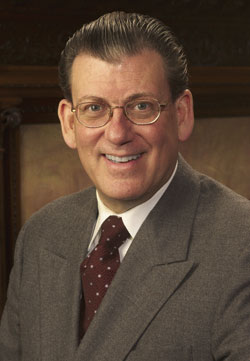Changes to bar pass standards delayed by lack of state data, panel says

Photo of Jeffrey Lewis courtesy of the St. Louis University School of Law
A lack of national uniformity has encouraged an ABA committee to back away from recommending immediate changes in bar pass requirements of the law school accreditation standards.
The Section of Legal Education and Admissions to the Bar’s standards review committee, which is wrapping up a comprehensive review of the standards, says it needs more time and information to come up with a workable proposal.
The committee, which met during the ABA Midyear Meeting, was supposed to take up a draft proposal to require a law school to show that 75 percent of its graduates who took a bar exam in the two years after their graduation year had passed. Under the draft proposal, a law school also would be required to account for 80 percent of its graduates each year.
But the committee reluctantly agreed to table the proposal after concluding that it couldn’t recommend such a requirement to the section’s governing council, which must approve any changes in the standards, as long as there are jurisdictions that won’t provide name-specific bar pass/fail information to the test takers’ schools, either automatically or on request.
At the time, only 18 states automatically provided such information to any school from which a test-taker graduated. Fifteen states automatically provided the data to in-state schools but required out-of-state schools to request it. Ten states and the District of Columbia would provide the information only on request. Four states and five U.S. territories wouldn’t provide it, and three states would do so only under certain conditions.
“Everybody agrees that the standard we have now needs to be revised,” says committee chair Jeffrey E. Lewis, a professor and dean emeritus of St. Louis University School of Law. “We just think we need to get all of the state bar examiners on board first.”
Lewis is confident that day will come in the next year or so. The committee has already made a lot of progress, he says, in its efforts to promote the universal disclosure of such information. And the section’s governing council, at the com-mittee’s request, has adopted a resolution calling on jurisdictions that don’t provide such information to start doing so.
In the meantime, Lewis says, the committee needs to find a way to factor into any proposed standard a method to account for variations in average bar pass rates, which can fluctuate widely between states and even from one year to the next within a state. And that almost certainly won’t happen before August, when the committee hopes to wrap up its comprehensive review of the standards and Lewis’ term as chair comes to an end.
Until then, the committee unanimously agreed to recommend turning the existing bar pass requirement, currently contained in an interpretation, into a standard. This is in keeping with the committee’s decision at the outset of the review process to more clearly distinguish that which is mandatory from what is merely guidance.
STANDARD SETBACK
Under the current interpretation, a law school can meet the bar pass requirement in one of two ways: It can either show that 75 percent of its graduates who took the bar exam in at least three of the previous five years passed, or that its graduates’ first-time bar pass rate was no more than 15 points below the average bar pass rate for ABA-approved schools in states where its graduates took the bar.
Former committee member Erica Moeser spearheaded the effort to simplify and toughen the bar pass requirement. She says the current requirement is so weak as to be meaningless, adding that she’s a little discouraged to hear that the “cold hard facts” she brought to the table as president of the National Conference of Bar Examiners hadn’t won the day. But she views the committee’s decision as a temporary setback. “I’m an optimist,” she says. “I still think the day will come when the bar pass standard becomes a real standard.”
At its February meeting, the committee also:
• Recommended eliminating the current ban on granting academic credit for participating in a field placement program for which the student is paid.
• Left intact its recommendation raising the experiential learning requirement from one credit hour to six.
• Declined to wade back into the debate over eliminating tenure as an accreditation requirement.
• Decided not to quantify the standard that law schools should provide “substantial opportunities” for students to participate in pro bono services or law-related public service.
This article originally appeared in the April 2014 issue of the ABA Journal with this headline: “A Delay in Bar Pass Standards: States vary on reporting needed data, panel says.”



